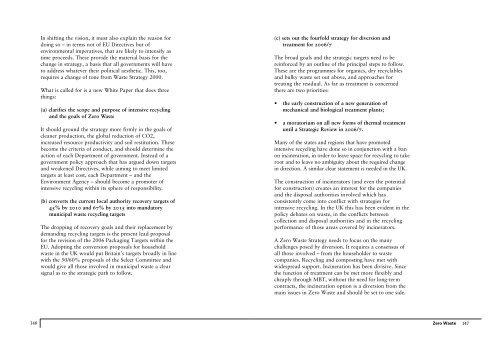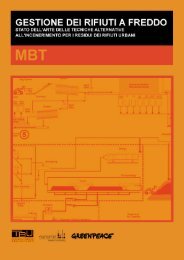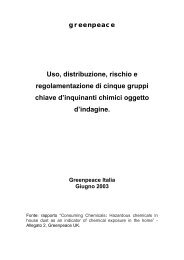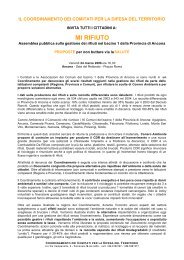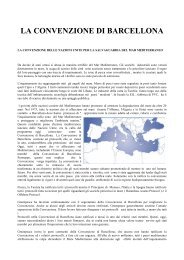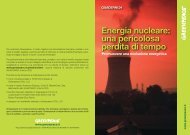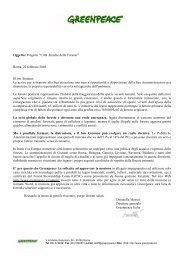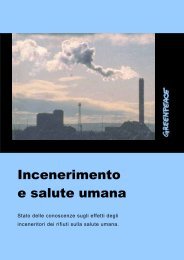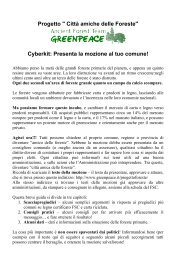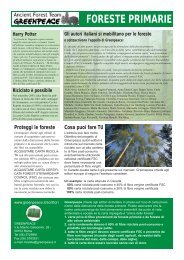Zero Waste by Robin Murray, Greenpeace Environmental Trust 2002
Zero Waste by Robin Murray, Greenpeace Environmental Trust 2002
Zero Waste by Robin Murray, Greenpeace Environmental Trust 2002
Create successful ePaper yourself
Turn your PDF publications into a flip-book with our unique Google optimized e-Paper software.
In shifting the vision, it must also explain the reason for<br />
doing so – in terms not of EU Directives but of<br />
environmental imperatives, that are likely to intensify as<br />
time proceeds. These provide the material basis for the<br />
change in strategy, a basis that all governments will have<br />
to address whatever their political aesthetic. This, too,<br />
requires a change of tone from <strong>Waste</strong> Strategy 2000.<br />
What is called for is a new White Paper that does three<br />
things:<br />
(a) clarifies the scope and purpose of intensive recycling<br />
and the goals of <strong>Zero</strong> <strong>Waste</strong><br />
It should ground the strategy more firmly in the goals of<br />
cleaner production, the global reduction of CO2,<br />
increased resource productivity and soil restitution. These<br />
become the criteria of conduct, and should determine the<br />
action of each Department of government. Instead of a<br />
government policy approach that has argued down targets<br />
and weakened Directives, while aiming to meet limited<br />
targets at least cost, each Department – and the<br />
Environment Agency – should become a promoter of<br />
intensive recycling within its sphere of responsibility.<br />
(b) converts the current local authority recovery targets of<br />
45% <strong>by</strong> 2010 and 67% <strong>by</strong> 2015 into mandatory<br />
municipal waste recycling targets<br />
The dropping of recovery goals and their replacement <strong>by</strong><br />
demanding recycling targets is the present lead proposal<br />
for the revision of the 2006 Packaging Targets within the<br />
EU. Adopting the conversion proposals for household<br />
waste in the UK would put Britain’s targets broadly in line<br />
with the 50/60% proposals of the Select Committee and<br />
would give all those involved in municipal waste a clear<br />
signal as to the strategic path to follow.<br />
(c) sets out the fourfold strategy for diversion and<br />
treatment for 2006/7<br />
The broad goals and the strategic targets need to be<br />
reinforced <strong>by</strong> an outline of the principal steps to follow.<br />
These are the programmes for organics, dry recyclables<br />
and bulky waste set out above, and approaches for<br />
treating the residual. As far as treatment is concerned<br />
there are two priorities:<br />
• the early construction of a new generation of<br />
mechanical and biological treatment plants;<br />
• a moratorium on all new forms of thermal treatment<br />
until a Strategic Review in 2006/7.<br />
Many of the states and regions that have pro m o t e d<br />
intensive recycling have done so in conjunction with a ban<br />
on incineration, in order to leave space for recycling to take<br />
root and to leave no ambiguity about the re q u i red change<br />
in direction. A similar clear statement is needed in the UK.<br />
The construction of incinerators (and even the potential<br />
for construction) creates an interest for the companies<br />
and the disposal authorities involved which has<br />
consistently come into conflict with strategies for<br />
intensive recycling. In the UK this has been evident in the<br />
policy debates on waste, in the conflicts between<br />
collection and disposal authorities and in the re c y c l i n g<br />
p e rf o rmance of those areas covered <strong>by</strong> incinerators.<br />
A <strong>Zero</strong> <strong>Waste</strong> Strategy needs to focus on the many<br />
challenges posed <strong>by</strong> diversion. It requires a consensus of<br />
all those involved – from the householder to waste<br />
companies. Recycling and composting have met with<br />
widespread support. Incineration has been divisive. Since<br />
the function of treatment can be met more flexibly and<br />
cheaply through MBT, without the need for long-term<br />
contracts, the incineration option is a diversion from the<br />
main issues in <strong>Zero</strong> <strong>Waste</strong> and should be set to one side.<br />
146<br />
<strong>Zero</strong> <strong>Waste</strong><br />
147


